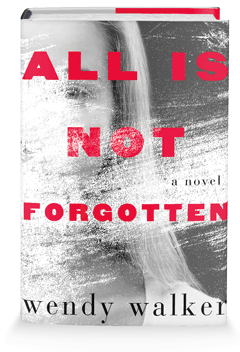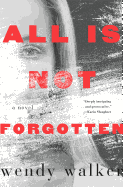All Is Not Forgotten
by Wendy Walker
All Is Not Forgotten has been compared to Defending Jacob and Reconstructing Amelia, among other psychological thrillers, and the comparisons are apt. Like those books before it, All Is Not Forgotten is a novel of psychological suspense that will force readers to question what they think they know--about what they've read and the world they live in.
Set in Fairview, Conn. (a small, affluent town complete with country club and BMW-lined streets), Wendy Walker's story is, on its surface, about a teenager named Jenny Kramer who is brutally attacked at a local party. Following her rape, the Kramers opt to ease their daughter's pain by approving a controversial medical procedure designed to erase Jenny's memories of the attack. "They say it is a miracle treatment--to have the most horrible trauma erased from your mind." And the miracle treatment works--while Jenny is informed of the overall facts of her case, she recalls nothing of it herself.
In the months that follow, the consequences of this decision become more and more apparent to everyone. The police are left with no leads and little hope of identifying, and thereby finding, Jenny's attacker. She cannot remember the event specifically, and is left haunted by her past and unable to return to her former happy teenage self. Jenny's father, Tom, becomes obsessed with finding her attacker, while his wife, Charlotte, prefers to pretend that nothing out of the ordinary has happened.
All Is Not Forgotten offers readers a well-imagined and very human look at the lasting impact of tragedy--on the individual at the psychological level, and on families and communities. As the police fail to turn up suspects in Jenny's case, the idyllic town of Fairview becomes a place of secrecy and whispers. As Tom and Charlotte take different and incompatible approaches to handling their daughter's trauma, cracks in what appeared to be a happy, stable marriage begin to appear. And as Jenny works with her psychiatrist to cope with her emotional memory of the attack--divorced from any factual recollection of events by the treatment she received--the whole family must come to terms with the ramifications of her altered memory.
All of this drives at big questions about decisions and their consequences. Most specifically, these are tied into Jenny's treatment. Given the choice between justice and forgetting, which would you choose? And could you live with the consequences of that decision?
Walker also touches on more mundane decisions, the type we make every day, and how those impact our lives: how we handle a particular parenting situation, how we interact with our loved ones, how far we might go to protect ourselves and our families. And what it is that makes us regret the decisions we've made:
"We are all just walking slowly to our graves, trying not to think about it, trying to find meaning, to pass the time pleasantly," writes Walker. "It can be a good thing, to remember that there is very little that truly matters. A bad grade. A dumb politician. A social slight. Unfortunately, there are things that do matter. Things that can ruin what little time we have here. Things that cannot be done over or remedied. These are the things that we regret."
All Is Not Forgotten weaves together many storylines--but in Walker's hands, the novel never feels confusing or overwhelming. Instead, it reads like a conversation. The thread of the story may jump back in time, or switch to give detail on another character or event, but only in ways that serve to advance the overall trajectory of the plot. Small asides that acknowledge the reader's place in the story help it feel more grounded along the way, serving as reminders of what story is being told and, as it is revealed, who is telling it--and why.
"Empathy is defined this way: 'the ability to share and understand the feelings of another.' ...[we] tell our stories, sometimes in meticulous detail, watch the expressions in others as they take in the words. We do this so we are not alone as we walk slowly toward our death. Empathy is at the core of our humanity. Life is pain without it."
The characters that occupy the pages of All Is Not Forgotten are flawed and imperfect in their humanity, and all the more engaging because of it. They experience hardships and pain and try their best to make their way through both. Witnessing the ways they tell their stories to each other in the midst of all of this--and the way that Wendy Walker tells their stories to us as readers--cements Walker not only as an expert storyteller, but All Is Not Forgotten as an excellent novel of psychological suspense. --Kerry McHugh







